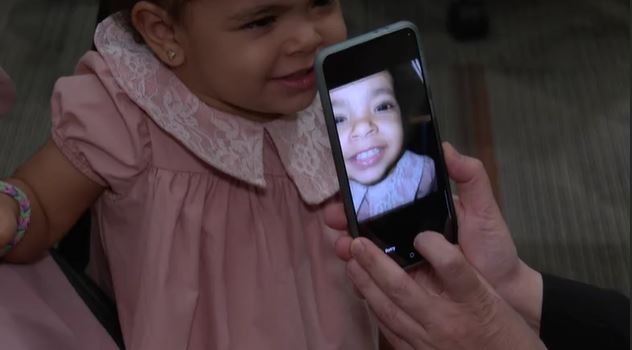Bringing the dentist to you: UR developing app to identify tooth decay in children

Haya, 2, has the integrity of her teeth checked through the SMARTeeth app, which is being developed at the University of Rochester. (Photo: Bekka Fifield/WHEC)
ROCHESTER, N.Y. – We’re all familiar with the phrase “There’s an app for that.”
Soon, there will be one to detect tooth decay and other dental problems.
It’s being developed right now by the University of Rochester.
While the app will be available to everyone, developers really want to get it in the hands of underprivileged families.
Here’s how SMARTeeth works as demonstrated with the help of two-year-old Haya.
First you’ll take a picture of your child’s teeth.
And then the picture will be analyzed by artificial intelligence to see if there are any signs of tooth decay.
“It works pretty much like a dentist. So the app takes a picture so we have a visual of the child’s mouth. And then the algorithm, which is trained using artificial intelligence and in particular deep learning, will look for similar cues that a dentist would use to identify dental caries (tooth decay or cavities),” said UR Professor of Computer Science Dr. Jiebo Luo.
Luckily, Haya has perfect teeth. But if she didn’t, the developers are working on a feature that will connect you with a dentist if a problem is detected.
The project started three years ago with the goal of helping low income families get better access to dentistry care.
“With this app, we essentially move part of the dental care to the home of these families so they could screen and monitor the condition, oral conditions of the children on a continuous basis,” Luo said.
The creators behind the app say parents can use it even if they don’t suspect their child is having problems.
But there are some things to look out for in general, like white spots, which signify tooth decay, and can be reversed if caught early.
“So it is sad and also when children have tooth decay, they may not be able to really tell you they are in pain, but it will affect their eating, their learning, their normal life activities. So it is very sad to see that,” dentist and UR Associate Professor Dr. Jin Xiao said.
Thirty-five families are a part of the pilot group testing SMARTeeth. The app won’t be out until 2025.